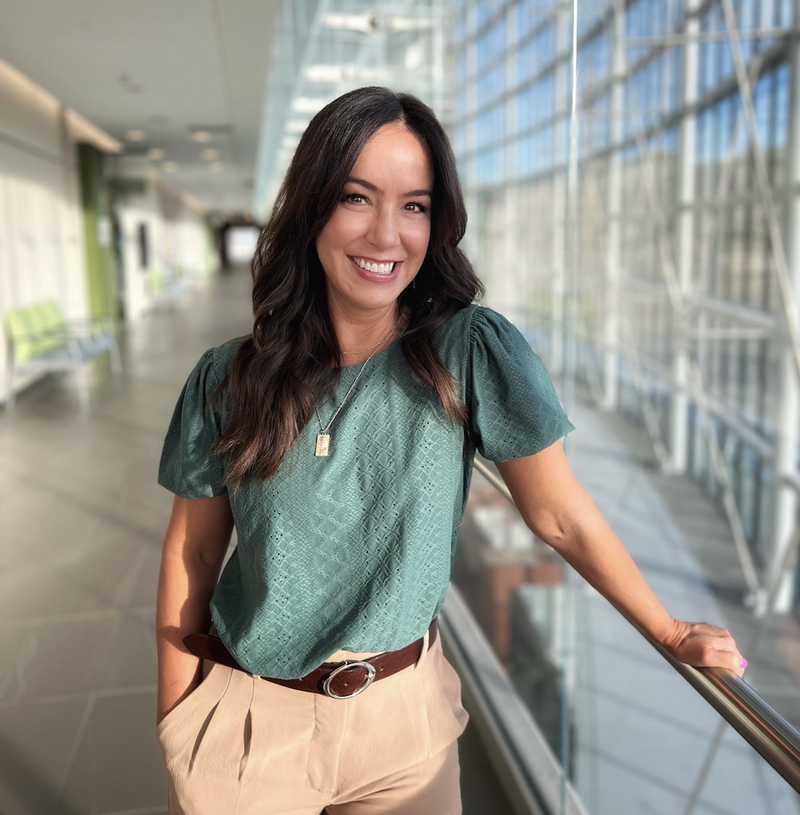
ALS community stories
Each person’s experience with ALS is different and comes with a unique set of challenges that spark inspiration and hope. It is through sharing these experiences that we can help one another.
Innovative technologies empowering persons living with ALS to reclaim their voice
August 27, 2025

For people diagnosed with amyotrophic lateral sclerosis (ALS), 80 to 95 per cent of them will, at some point, no longer be able to communicate using their natural speech.1 As the disease progresses, it attacks motor neurons that control muscles, leading to impairments in voluntary muscle, including the ability to speak.2
According to Kerry Adams, Speech and Language Pathologist (SLP) at the Kaye Edmonton ALS Clinic, while losing the ability to speak can be both physically and emotionally devastating, seeking help early in the course of the disease can provide more options for preserving a person’s ability to communicate.
New advances in technology are paving the way for better solutions for people living with ALS whose speech is impacted by the disease.
Kerry is sharing new updates to augmentative and alternative communication (AAC) that allows ALS patients to preserve their identity and maintain a sense of empowerment by reclaiming their voice.
New Technology
Voice Cloning
As artificial intelligence (AI) becomes more integrated into healthcare practices, it is offering new hope for individuals losing their voices to ALS.
People living with ALS can now use short recordings of their voice – as little as one minute – to create an AI voice clone that sounds natural and conversational, with personal elements such as emotion and inflection. This generated voice will then be programmed into communication devices, phones, or tablets, allowing it to replicate that person’s natural voice using text input.
The opportunity for me to give someone the gift of their voice is immensely rewarding because I'm essentially helping them regain part of their identity. Kerry Adams, Speech and Language Pathologist
What makes this technology truly remarkable for Kerry and her patients is the ability to use historical voice recordings – captured before the onset of ALS – to train the AI model. Until recently, individuals who had not banked their voice in advance, or whose speech had already been significantly affected, were limited to using a generic synthesized voice on their communication devices. Now, even short audio clips from the past can be used to create a personalized, unique vocal identity.
Kerry shared a compelling example of one of her patients, a former preacher, who was able to use recordings of his past sermons to create his own unique voice clone in both Mandarin and English.
Here is another example of one of Kerry’s patients using AI voice cloning, and his reaction to hearing his voice clone after experiencing speech change due to ALS:
“Canadians can access the AI voice cloning technology through the non-profit organization Bridging Voice, which has partnered with ElevenLabs to provide free voice clones to individuals with ALS," says Kerry. "The first step is contacting a local SLP or AAC specialist to begin the process."
For patients with existing voice recordings, whose disease has not yet impacted their speech, this technology may offer them some additional time to process their diagnosis without the immediate pressure to preserve their voice. However, Kerry still encourages people to consider recording their voices early in their diagnosis, if possible, so they have more options.
Learn more: https://bridgingvoice.org/elevenlabs/
Existing Technology
Voice Banking
Voice banking creates a custom, synthesized version of a person’s voice based on samples of their speech. It is done by recording hundreds of sentences through an online platform, while the person still has the ability to speak clearly. The more sentences one records, the better the computerized voice will sound. Although, it will not have emotion or much inflection, it will have nuances to that person’s natural voice.
Once needed, a person experiencing loss of speech using voice banking will have a device with a computer-generated voice that sounds similar to their own based on their recordings.
“Voice banking is like an insurance policy on your voice,” Kerry explains. “Even if a person isn’t experiencing any speech impairment at that time, that's even better – a perfect time to start the voice banking.”
Kerry also notes that anyone can donate their voice to help others living with ALS. Finding a similar voice can make a lot of difference for someone who did not have the opportunity to bank their own.
Message Banking
Message banking utilizes pre-made recordings to preserve a voice. This process has a person record specific, personalized expressions or phrases in their natural voice. These might include catch phrases, jokes, laughter, or other meaningful sounds. The recorded messages can later be programmed on a phone/tablet or communication device to use in conversations. It captures unique elements of someone’s personality by preserving common things they say and how they say it.3
“Both voice and message banking can be an emotional process,” says Kerry. “But these technologies and tools can have a positive impact on the well-being and quality of life of people impacted by ALS.”
The importance of early action
Even though new technology is offering more seamless options for voice preservation, Kerry strongly recommends that persons diagnosed with ALS access these resources as early as possible.
“The best time for voice preservation is as soon as possible after a diagnosis of ALS, while patients have their strongest voice,” Kerry says. “Early referral to a speech language pathologist can help those impacted by ALS, and their loved ones, determine what options are the best match for their needs.”
Disclaimer: While ALS Pathways is sponsored by Mitsubishi Tanabe Pharma Canada (MTP-CA), MTP-CA does not endorse any technology or service mentioned in this article. Persons diagnosed with ALS should speak to their Speech and Language Pathologist and/or care team to determine the tools and support that are best suited to their individual needs.
1. Brent JR, Franz CK, Coleman JM 3rd, Ajroud-Driss S. ALS: Management Problems. Neurol Clin. 2020;38(3):565-575. doi:10.1016/j.ncl.2020.03.013
2. ALS Pathways. Canada: ALS Overview; c2023. Accessed on November 27, 2023. How Does ALS Affect the Body? Available from: https://www.alspathways.ca/als-overview/
3. The Voice Keeper. Orlando. All Posts; c2020. Accessed on November 27, 2023. What Are The Key Differences Between Voice Banking And Message Banking? Available from: https://www.thevoicekeeper.com/post/voice-banking-vs-message-banking
